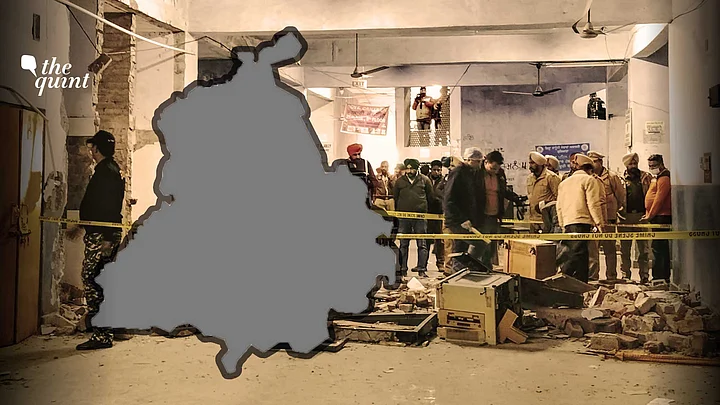One person was killed and at least six others injured after a bomb exploded in a washroom inside a court complex in Ludhiana.
The blast came at a time when Punjab was already on the edge following a major sacrilege attempt at Harmandir Sahib in Amritsar and another alleged sacrilege in Kapurthala. The people accused of committing sacrilege were killed in both these cases.
Are these incidents related? We don't know as yet. Maybe we never will.
What we do know is that many in Punjab are seeing these events as efforts to destabilise the state and create divisions ahead of the Assembly elections due in February 2022.
MAUR MANDI BLAST 2017
On 31 January 2017, barely four days before polling for the previous Assembly elections, a blast took place outside a public meeting for Congress candidate Harminder Singh Jassi at Maur Mandi in Bathinda district. Seven people were killed and 13 injured in the blast.
The blast was initially said to be the handiwork of Khalistani extremists. A story appeared in a national newspaper quoting police sources as saying that they suspected the involvement of Pakistan based militants Ranjit Neeta and Harmeet.
Later, it was found out that Khalistanis had nothing to do with the blast and it was allegedly the handiwork of Dera Sacha Sauda followers.
However, by that time the elections were already over and the blast did influence the voting pattern to some extent. Several Hindu voters are said to have shifted at the last moment towards Captain Amarinder Singh, fearing that the Aam Aadmi Party coming to power could lead to a revival of Khalistani extremism.
During the election, a perception was created that AAP had elements who were pro-Khalistan, though there wasn't much substance to these allegations.
There has been very little progress in the probe into the Maur Mandi blast. The Opposition and even the present home minister Sukhjinder Randhawa have accused the previous CM Captain Amarinder Singh of "hushing up the probe."
Randhawa too hasn't said much on it much since then.
The least that the political class and media should have done, is not to jump to conclusions regarding the Ludhiana blast, especially given the experience of the Maur Mandi blast which had also taken place before elections.
Not surprisingly, a media house had already started alleging that Babbar Khalsa is behind the Ludhiana blast even though the police have made no such claim till now.
Incidentally, the same media house had alleged a Pakistan angle to the Kapurthala killing and had insinuated a Khalistan connection to the farmers' protest.
Media houses jumping the gun, would do well to recall the Maur Mandi example.
IT'S NOT JUST ABOUT ELECTIONS
Punjab is undergoing a historic political churn. The movement against the farm laws had united Punjabi society like never before in the past few decades. It took Punjab beyond binaries like urban-rural, Sikh-Hindu, old-young, domestic-diaspora, Jatt-Dalit, Panthic-Left etc.
The movement created a sentiment for change in the state, not necessarily a change of regime but a change in the way the state is ruled.
After the repeal of the laws, the general discourse in the state was that the success of the movement should be used as an opportunity to come up with a broader political and policy vision for the state.
After a long time, the will of the people was being reflected in the political discourse and this could have had an impact in the elections and beyond.
But the Ludhiana blast and the sacrilege row, whether connected or not, have the potential to rob Punjab of this historic moment.
That these incidents could impact voting choices in the upcoming elections is only one, relatively smaller part of the story.
The bigger, more debilitating effect that such incidents can have is to divide and demoralise people, that too after such a major popular upsurge as the anti-farm laws movement.
To play on the fears or sentiments of communities in Punjab to prevent any larger mobilisation has been an old trick mastered by the British regime during colonial times and continued by vested interests on both sides of the border since then.
Such fears were fanned even during the Punjabi Suba movement of the 1950s and the Dharam Yudh Morcha of the 1980s, even though neither of these movements were directed at any community.
Punjab would need to be united to thwart these attempts. Little can be expected from the political parties. It may be up to the people to save the phenomenal gains they had made during the farmers movement.
